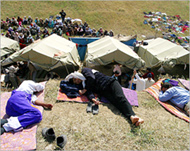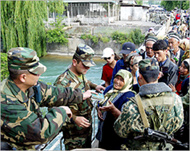Kyrgyzstan returns Uzbek refugees
Kyrgyzstan has forced scores of Uzbeks, who fled unrest in their country, to return despite fears they could face repression, but other refugees vowed to go home voluntarily to demand their government’s ouster, according to a Kyrgyz official.

“We have nothing to lose,” said Khasan Shakirov, surrounded by several dozen other Uzbek refugees at their tent camp near the border town of Kara Darya.
“We only have our lives, and we will sacrifice them for freedom.”
Shakirov and many others in the camp said on Monday that they would march on the Uzbek capital, Tashkent, to push for the ouster of President Islam Karimov, whom they accuse of ordering troops to fire at demonstrators in the eastern city of Andijan on 13 May. Karimov has blamed Islamic rebels for the unrest and denied that troops had fired on civilians.
He also has denied opposition and rights activists’ accusations that more than 700 people were killed in the violence and stonewalled Western calls for an international investigation.
The government said 169 people were killed in Andijan.
UN protection sought
About 500 refugees, who settled in a tent camp in Kyrgyzstan, last week wrote a collective letter to UN Secretary-General Kofi Annan, begging for protection amid fears the Kyrgyz authorities would cave in to Uzbek pressure and expel them.
It was not clear what prompted some of the refugees to change their minds or how many wanted to return. The refugees, the majority of whom are men, said they would set a departure date after they got more information about the situation in Uzbekistan.
 |
|
The Kyrgyz government has |
The Kyrgyz government said on Sunday that it wasn’t going to provide political asylum for all of the camp residents.
“We don’t consider them refugees,” Almambet Matubraimov, acting Kyrgyz President Kurmanbek Bakiyev’s envoy to southern Kyrgyzstan, told The Associated Press. “We are trying to send them back.”
Kyrgyz military Colonel Abdumajid Abdurakhimov, who is in charge of security at the refugee camp, said on Monday that authorities handed over 85 Uzbeks who had tried to cross into Kyrgyzstan since the violence erupted.
Bigger exodus feared
Abdurakhimov said that letting more Uzbeks cross the border and stay could trigger a much bigger exodus from Uzbekistan than impoverished Kyrgyzstan could handle. But he acknowledged there were concerns about the safety of the returnees.
“If we had let them all come, their number here (at the camp) would have been 10 times higher, 5000 instead of 500,” Abdurakhimov said.
 |
|
Kyrgyzstan has been urged to |
He said Uzbek authorities had set up a camp to process the returnees and those without criminal records would be let go.
“Personally, I feel that they treat them very cruelly there,” he said.
The UN refugee agency has urged Kyrgyzstan to provide a shelter for all Uzbeks fleeing violence and promised assistance.
“Our official position is that according to conventions signed by Kyrgyzstan, people should be given the right to apply for asylum,” said Vanno Noupech, representative for the United Nations High Commissioner for Refugees, at the camp.
“We appealed to the Kyrgyz government to open the border and give these people an opportunity to file for asylum.”
|
“We appealed to the Kyrgyz government to open the border and give these people an opportunity to file for asylum” Vanno Noupech, |
Uzbek pressure
However, Kyrgyzstan feels strong pressure from Uzbekistan, which has admonished Kyrgyz officials for letting refugees cross the border and allegedly encouraging Islamic extremists.
On Monday, the Kyrgyz Foreign Ministry sent a response to a diplomatic protest by Uzbekistan and said it was “taking concrete measures to prevent sources of tension,” denying alleged militants had been allowed to cross into the country.
Kyrgyzstan also said it would ensure border controls at Kara-suu, which lies across the frontier from the Uzbek town of Korasuv, a flashpoint of tension where a farmer turned opposition leader proclaimed an Islamic state before
he was arrested last week.
Uzbekistan and Kyrgyzstan have eyed each other with suspicion and, sometimes, with open enmity.